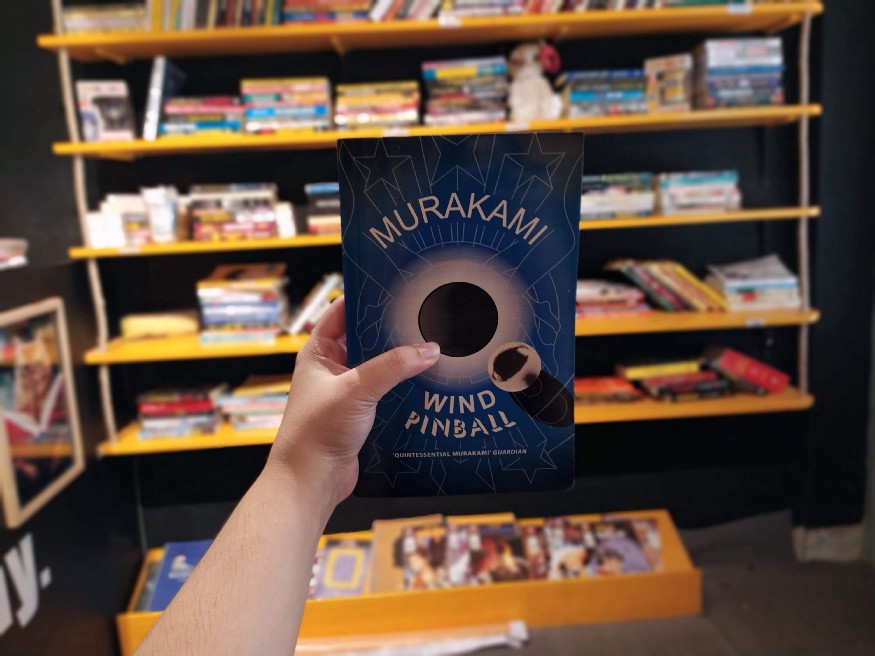While I am at the crossroads of life, transitioning from High School to the University phase, I took to seeking inspiration from some of my idols, and the discoveries I made along the way are blissful. This is a tribute to Haruki Murakami, for bringing new ideas to the table.
I come across remarks like, “Murakami is so complex, I don’t get it” or “he is so overrated” and “you are so pretentious” whenever I say he is my favorite author. The explanation is simple: his writing is built around a mental state and not a ground of conventional fiction, which is what I enjoy about it.
I always say this: Murakami comes in bits and pieces, and that’s how he should be read. However, this isn’t a guide to understanding him, but a guide to learning to love him.
Reading about a Book Cafe in a Book Cafe

My work days are never mundane, per se, because they have their own perks- you can never have enough books to read or enough music to listen to. “Wind Pinball” was the latest arrival that day so I picked it up and started skimming through.
Note: I was about to read the first author’s note of my life. I am not proud of it, but I usually immediately indulge in a mouthful of whatever book I am reading, without reading its back story- which is going to change (soon).
The title read: “The Birth of my Kitchen Table Fiction”.
It stirred something in me. This is where I discover the root of my fascination: how “Haruki Murakami” and his eccentric style came to being, although I was completely unaware of the content.
“Young people like us who were determined to avoid “company life” at all costs were launching small shops left and right. Cafes and restaurants, variety stores, bookstores — you name it. Several places near us were owned and run by people of our generation. Kokubunji retained a strong counterculture vibe, and many of those who hung around the area were dropouts from the shrinking student movement.” — Haruki Murakami, The Birth of my Kitchen Table Fiction
I glanced at the laptop, then at the espresso machine behind it, and finally towards the bookshelf across from me. I felt a passage of butterflies underneath my skin. You don’t plan this stuff- you don’t sit in a book cafe and just imagine reading about your idol doing the same at the same age as you, in the same place and political horizon.
The only difference was, he was in Japan, back in the 80s, in his tennis-inspired tracks and vans, and I am here in Dhaka, dealing with my materialistic problems in the 21st Century- a dreamer in the rough.
I could picture him in my shoes right then, waiting relentlessly for customers, dusting the covers, and reading all day. However, unlike me, the thought of writing hadn’t crossed him then. The actual story of him becoming a writer is more complex and odd, much like his fiction.
Kitchen Table fiction?
I wondered whether there was actually a genre like that; but the mixture of contemporary, noir and post-modernism created over a typewriter on a kitchen table is literally what he meant.
His first works “Hear the Wind Sing” and “Pinball” have been critically acclaimed and even rewarded, but the truth is, he wrote them by fluke. Like many of his fans- who have at least read his more popular works- Murakami isn’t particularly a fan of his debut, although his style did develop through it.
He used to translate his introductory paragraphs from English, with whatever limited command he had over the language, and he noticed a syntactic pattern that was unlike anything he had read before. The stream of consciousness in his writing that often drives us into trances is also a product of his personal experiences.
Bookstores
My employer had walked in by the time I had finished reading the introduction, because I hadn’t realised how long it took me to savour each word and daydream about them. While we sorted the day’s orders into Excel files, I couldn’t help but wonder what it must have been like, to be an ordinary shop owner one day and become a worldwide best selling author sometime in the future?
I wondered what I’d call my own genre; would some other reader, with the same passion, read my work, or this story of my discovery in some unknown bookstore and feel butterflies like I did, with the same gleam in their eyes? I wondered, and wandered.
Photos taken at: Worthy Express, Lalmatia, Dhaka